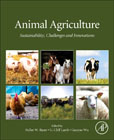
Animal Agriculture: Sustainability, Challenges and Innovations
Bazer, Fuller W.
Lamb, G. Cliff
Wu, Guoyao
Land-based production of high-quality protein by livestock and poultry plays an important role in improving human nutrition, growth and health, as well as economical and social developments worldwide. With exponential growth of the global population and marked rises in meat consumption per capita, demands for animal-source protein are expected to increase 72% between 2013 and 2050. This raises concerns about the sustainability and environmental impacts of animal agriculture. An attractive solution to meeting increasing needs for animal products and mitigating undesirable effects of agricultural practices is to enhance the efficiency of animal growth, reproduction, and lactation. The application of techniques in biotechnology can help to achieve this goal. In addition, a promising, mechanism-based approach is to optimize the proportion and amounts of amino acids and other nutrients in diets for maximizing whole-body protein synthesis and feed efficiency. Furthermore, new management skills are required to reduce various environmental and disease-associated stresses in livestock and poultry under practical production conditions. Improvements in farm animal productivity will not only decrease the contamination of soils, groundwater, and air, but will also help sustain animal agriculture to produce high-quality protein for the expanding global demand in the face of diminishing resources. Currently there is no resource that offers specific knowledge of both animal science and technology including biotechnology for the sustainability of animal agriculture for the expanding global demand of food in the face of diminishing resources. In one book readers will find all the necessary information on important issues facing modern animal agriculture, namely its sustainability, challenges and innovative solutions. This book features new advances in animal breeding, biotechnology, nutrition, reproduction and management, as well as meat science. Such knowledge is expected to transform global animal production practices. Integrates new knowledge in animal breeding, biotechnology, nutrition, reproduction and managementAddresses the urgent issue of sustainability in modern animal agricultureProvides practical solutions to solving current and future problems that face animal agriculture worldwide INDICE: 1. Introduction: Significance and challenges of animal production Part 1: Beef cattle production 2. Genetics and breeding of beef cattle 3. Physiology and pregnancy of beef cattle 4. Reproductive management of beef cattle 5. Nutrition and feeding of confined and grazing beef cattle Part 2: Lactation and management of dairy cattle 6. Genetics and genomics of dairy cattle 7. Physiology of lactation in dairy cattle 8. Reproductive management of dairy cattle 9. Nutrition and feeding of dairy cattle Part 3: Sheep and goat production 10. Genetics and breeding of sheep and goats 11. Reproductive physiology of sheep and goats 12. Reproductive management of sheep and goats 13. Nutrition and feeding of sheep and goats Part 4: Swine production 14. Swine genetics and breeding 15. Reproductive physiology of swine 16. Reproductive management of swine 17. Nutrition and feeding of swine Part 5: Poultry production 18. Poultry genetics and breeding 19. Reproductive physiology and hatching of poultry 20. Reproductive management of poultry 21. Nutrition and feeding of poultry Part 6: Biotechnologies and others in animal production 22. Muscle biology and meat quality 23. Production of transgenic animals 24. Fermentation techniques in feed production 25. Mathematical modelling in animal production 26. Manure utilization in production systems
- ISBN: 978-0-12-817052-6
- Editorial: Academic Press
- Encuadernacion: Rústica
- Páginas: 500
- Fecha Publicación: 15/01/2020
- Nº Volúmenes: 1
- Idioma: Inglés
